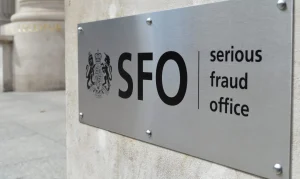The Serious Fraud Office (SFO) has the task of investigating and prosecuting serious or complex fraud, bribery and corruption. Aziz Rahman of law firm Rahman Ravelli outlines how the SFO works and how best to respond to it during an investigation.
Since Lisa Osofsky became Director of the SFO in 2018 she has made a number of changes. She brought a number of new senior figures into the agency, has talked of the need for greater speed and efficiency and has dropped certain long-running investigations. Osofsky also wants greater co-operation with other national and international enforcement agencies and with the business community.
Yet the SFO has made it clear that any co-operation with it must be more than going through the motions in an attempt to gain lenient treatment. This is why those who have dealings with the SFO need to know how to proceed.
The Importance of the Right Response
Any company or individual that is investigated by the SFO – or has reason to believe it is about to be investigated by the agency – has to know exactly how to respond. This can only be done effectively if those under investigation know how the SFO functions and are able to use this to help construct the strongest defence possible.
The SFO has teams of skilled experts and unique powers. Section 2 of the Criminal Justice Act 1987 – the Act that created the SFO – gives it the power to compel any individual or organisation to provide it with information or documents that it believes are relevant to an investigation.
The SFO is also able to offer an organisation that is the subject of an investigation a deferred prosecution agreement (DPA), which is an alternative to a prosecution. A DPA involves a prosecution being suspended if the accused admits the wrongdoing and agrees to meet certain conditions. In the most recent DPA, in January 2020, aircraft manufacturer Airbus agreed to pay 991 million euros to settle bribery allegations. This was part of a 3.6 billion euro global settlement that Airbus concluded with UK, US and French authorities.
Any company or individual that is investigated by the SFO – or has reason to believe it is about to be investigated by the agency – has to know exactly how to respond.
DPA’s became part of UK law under the Crime and Courts Act 2013. As of March 2020, there had only been seven concluded. The SFO has made it clear it will not give them out to every organisation seeking one in order to avoid prosecution.
Challenging the SFO
A defence lawyer with business crime expertise can challenge SFO allegations. This can lead to the SFO starting to doubt the strength of its case and even dropping its investigation. It should be emphasised that a successful challenge to SFO accusations and / or its activities is more likely the earlier expert legal help is sought.
Legal challenges to the obtaining of search warrants, the way searches are conducted or what material is seized should be made at the first opportunity. The information and material the SFO intends to use as evidence can also be challenged.
Section 21 of the Police and Criminal Evidence Act (PACE) gives people access to their material that has been seized by the SFO. The Attorney General’s Guidance on Disclosure (December 2013) laid down guidelines on dealing with the seizure and search of digital material. Both these measures are there to prevent the subject of an investigation being unfairly disadvantaged.
It is also important to note that the SFO does make mistakes. In one high-profile example, the SFO investigated the brothers Robert and Vincent Tchenguiz, searched their premises and made arrests. But then the brothers’ lawyers proved that the SFO had not properly checked the information it presented to court when applying for search warrants. As a result, the SFO paid £4.5M to the brothers and apologised.
[ymal]
Negotiating with the SFO
While challenging the SFO can be worthwhile, negotiation can also be a valuable way of obtaining the best possible outcome to an investigation. The SFO’s current Director has spoken of wanting investigations concluded quicker and of being open to making a deal. This may mean there is now a greater possibility of negotiating a favourable outcome than there was under previous SFO regimes.
But negotiating with the SFO can only be useful if you know exactly what wrongdoing - if any - has been committed. The SFO expects co-operation to be genuine. It will take an unfavourable view of any moves to negotiate with it if any information about wrongdoing that was not previously disclosed comes to light. Which is another reason why any dealings with the SFO must be considered very carefully.





















